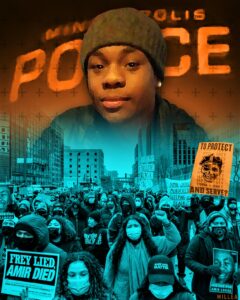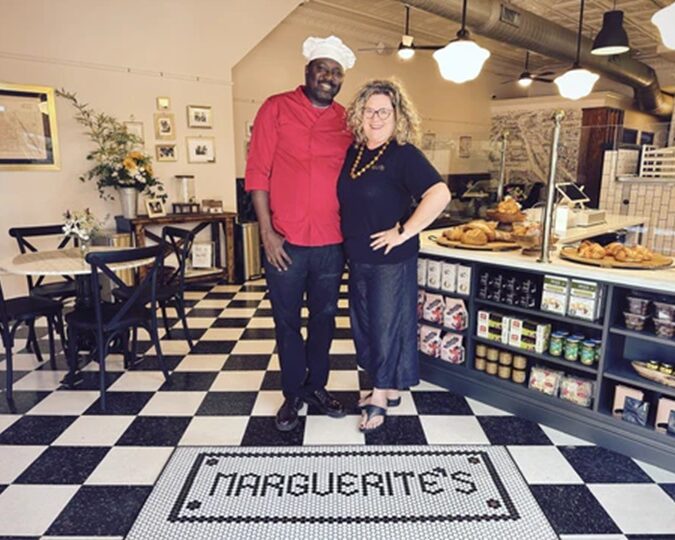BY ED FELIEN

Illustration by Bob Millea / Photo by Brad Sigal
Just before sunrise on Feb. 2, the MPD SWAT team bursts into a downtown apartment: “Police!” “Search warrant!” “Get on the ground!” Amir Locke is asleep on a couch, under a blanket. They kick the couch. Amir gets up, turns to the officers. He is holding a gun. Officer Mark Hanneman shoots Amir twice in the chest and once in the wrist.
It took less than 10 seconds, and Amir Locke was dead.
They had a no-knock warrant. The St. Paul police had asked for assistance from the MPD in arresting a suspect in a homicide. Interim Police Chief Amelia Huffman asked the SWAT team to help. The Special Weapons and Tactics team said they wanted a no-knock warrant. It gave them a tactical advantage, the element of surprise. The chief signed off on it, even though her boss, Mayor Frey, had said he had abolished no-knock warrants.
The Fourth Amendment to the Constitution says, “The right of the people to be secure in their persons, houses, papers, and effects, against unreasonable searches and seizures, shall not be violated, and no Warrants shall issue, but upon probable cause, supported by Oath or affirmation, and particularly describing the place to be searched, and the persons or things to be seized.”
No-knock warrants violate the very essence of the Fourth Amendment. The point of the amendment is that all of us have a right to be secure in our homes, and we cannot have that right taken away from us without due process. Our right to be secure in our homes means we have the right to defend ourselves against an invasion of that home—no matter whom the invader claims to represent. We have a right to see the warrant and to contest it in a court of law. A no-knock warrant destroys that constitutional right.
Minneapolis Police Sergeant Mike Sauro led a no-knock raid in 1989 on the wrong house. He used a flash-bang grenade that caused a fire and killed Lillian Weiss and Lloyd Smalley.
We should not be under any illusion that Officer Hanneman will be convicted of killing Amir Locke. Even with Keith Ellison getting the state attorney general’s office involved, there is little likelihood that a prosecutor would be able to defeat Hanneman’s plea of self-defense. Amir was holding a gun. Hanneman will argue that he felt his and his partner’s lives were in danger. Former Police Chief Tony Bouza says, “There’s not a jury in the country that would convict him.”
Should Frey resign?
He lied about abolishing no-knock warrants while he was running for re-election last fall. Some of that can be ascribed to campaign hyperbole, but his exaggeration and lack of follow-through is disappointing. He has now initiated a temporary moratorium on no-knock warrants.
He promised transparency in his administration, but we don’t know how the decision came about to agree to the SWAT team’s request for the warrant. We don’t know the protocol for the SWAT team’s use of force. We don’t know who is training new SWAT team members and new recruits—we have heard from people who claim to have been MPD recruits that Office Mark Durand (the SWAT team leader in charge of the group that killed Terrance Franklin) is in charge. The point of transparency is to allow accountability. The public needs to know what is happening in order to know who is responsible. A line item budget of the MPD should be made available to the public. We have a right to know who these people are that are sworn to “Protect and Serve” the public.
Should Frey resign?
No. But he should get to work making good on his campaign promises. And he has a responsibility to explain the protocols associated with the killing of Terrance Franklin, Jamar Clark, Thurman Blevins and Travis Jordan and whether those protocols are still in place today. Further, he has a responsibility to tell us whether the officers involved in those killings have been disciplined for their actions.
Should interim Chief Huffman resign?
We know from an FBI study in 2006 that white nationalists were recruiting members to take over municipal police departments. We know that Bob Kroll, the twice-elected former head of the Minneapolis Police Federation, had a well-known history of racial discrimination against Black fellow officers. It was disappointing to learn that among Huffman’s first acts was to promote several of her buddies—further bloating the bureaucracy and taking officers off the street. She has failed miserably in controlling the gung-ho bullies in the SWAT team.
But, she is an interim chief until the mayor and City Council appoint a new chief. It seems misdirected energy to spend time hiring a new interim chief rather than doing a nationwide search for permanent chief.
Our best hope for permanent and meaningful change in our MPD will have to come from the four progressives on the Public Health and Safety (PHS) Committee.
This committee has six members:
LaTrisha Vetaw, Chair: She’s been outspoken and critical of Frey.
Elliott Payne, Vice-Chair: He’s said, in his campaign literature, “We cannot keep spending more than 30% of our city budget on a police force that targets, harasses, abuses, and kills our BIPOC neighbors.” We need to “divest $8 million in taxpayer dollars from police and invest in alternative responses to harm.”
Robin Wonsley Worlobahsaid in her campaign literature, “MPD does not bring public safety. They have never brought public safety. And they cannot be trusted to bring us public safety moving forward. It’s time for a new path.”
Jeremiah Ellison (Keith Ellison’s son) said on June 4, 2020, “We are going to dismantle the Minneapolis Police Department. And when we’re done, we’re not simply gonna glue it back together.” It almost cost him re-election.
Michael Rainville and Linea Palmisano will probably be the conservative opposition to the more progressive Mod Squad majority.
It is important that we all pay attention to what happens to these hopes and dreams.
We all know a better world is possible.
It’s inevitable.
But only if we work for it.
























